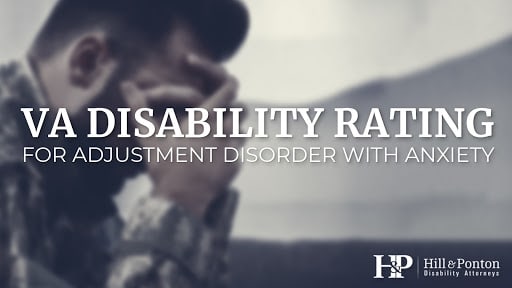Adjustment disorder is diagnosed in over a third of active-duty personnel and 12.8% of veterans, making it one of most common mental health conditions associated with the pressures of military life. Approximately one-third of anxiety disorder cases between 2000 to 2011 had co-occurring diagnoses of either adjustment or depressive disorder, whether from deployment, separation from loved ones, or the challenge of reintegration after service.
Types of Adjustment Disorder
The DSM-5 lists six types of adjustment disorder, each with its own symptoms:
Adjustment Disorder with Anxiety
Adjustment disorder with anxiety includes symptoms like nervousness, excessive worrying, jitteriness, and separation anxiety. Veterans with this subtype often experience:
- Persistent nervousness that interferes with daily activities
- Excessive worry that seems disproportionate to the situation
- Physical symptoms such as increased heart rate, sweating, or trembling
- Difficulty concentrating on tasks or making decisions
- Sleep disturbances including trouble falling or staying asleep
- Heightened startle response to ordinary stimuli
- Avoidance behaviors to prevent anxiety-provoking situations
- Anticipatory anxiety about potential future stressors
- Feelings of being overwhelmed by daily responsibilities
- Social withdrawal due to anxiety in social settings
Adjustment disorder with anxiety can significantly impact a veteran’s ability to maintain employment, relationships, and overall quality of life. Many veterans report that their anxiety symptoms are triggered by situations that remind them of stressors experienced during military service.
Adjustment Disorder with Depressed Mood
Adjustment disorder with depressed mood is characterized by common symptoms of depression such as low mood, tearfulness, and feelings of hopelessness.
Adjustment Disorder with Mixed Anxiety and Depressed Mood
Adjustment disorder with mixed anxiety and depressed mood causes symptoms of both anxiety and depression.
Other Types of Adjustment Disorder
- Adjustment Disorder with Disturbance of Conduct: Characterized by behavioral issues like acting rebellious, destructive, reckless, or impulsive.
- Adjustment Disorder with Mixed Disturbance of Emotions and Conduct: Causes anxiety, depression, and behavioral issues.
- Adjustment Disorder Unspecified: Characterized by maladaptive reactions that are not classified as one of the specific subtypes of adjustment disorder.
What Is the VA Rating for Adjustment Disorder?
VA evaluates adjustment disorder from 0% to 100%, based on the degree of occupational and social impairment. If a veteran has only mild symptoms of adjustment disorder with anxiety, and the disorder is controlled by medication, there may be a 10% rating assigned. However, a veteran who has non-stop fear, hallucinations, and is unable to work because of gripping anxiety may be rated up to 100%.
How VA Rates Adjustment Disorder
Ratings are determined under the General Rating Formula for Mental Disorders by how symptoms affect daily life:
- 100% rating – Total occupational and social impairment, due to such symptoms as: gross impairment in thought processes or communication; persistent delusions or hallucinations; grossly inappropriate behavior; persistent danger of hurting self or others; intermittent inability to perform activities of daily living (including maintenance of minimal personal hygiene); disorientation to time or place; memory loss for names of close relatives, own occupation, or own name.
- 70% rating – Occupational and social impairment, with deficiencies in most areas, such as work, school, family relations, judgment, thinking, or mood, due to such symptoms as: suicidal ideation; obsessional rituals which interfere with routine activities; speech intermittently illogical, obscure, or irrelevant; near-continuous panic or depression affecting the ability to function independently, appropriately and effectively; impaired impulse control (such as unprovoked irritability with periods of violence); spatial disorientation; neglect of personal appearance and hygiene; difficulty in adapting to stressful circumstances (including work or a worklike setting); inability to establish and maintain effective relationships.
- 50% rating – Occupational and social impairment with reduced reliability and productivity due to such symptoms as: flattened affect; circumstantial, circumlocutory, or stereotyped speech; panic attacks more than once a week; difficulty in understanding complex commands; impairment of short- and long-term memory (e.g., retention of only highly learned material, forgetting to complete tasks); impaired judgment; impaired abstract thinking; disturbances of motivation and mood; difficulty in establishing and maintaining effective work and social relationships.
- 30% rating – Occupational and social impairment with occasional decrease in work efficiency and intermittent periods of inability to perform occupational tasks (although generally functioning satisfactorily, with routine behavior, self-care, and conversation normal), due to such symptoms as: depressed mood, anxiety, suspiciousness, panic attacks (weekly or less often), chronic sleep impairment, mild memory loss (such as forgetting names, directions, recent events).
- 10% rating – Occupational and social impairment due to mild or transient symptoms which decrease work efficiency and ability to perform occupational tasks only during periods of significant stress, or symptoms controlled by continuous medication.
- 0% rating – A mental condition has been formally diagnosed, but symptoms are not severe enough either to interfere with occupational and social functioning or to require continuous medication.
Did the VA deny your disability claim for adjustment disorder, or do you feel your rating doesn’t truly reflect what you’re going through? We can help you win your claim.
TDIU for Adjustment Disorder
If your adjustment disorder symptoms make it difficult or even impossible to keep steady employment, you may qualify for Total Disability Individual Unemployability (TDIU). TDIU allows veterans facing severe mental health or other service-connected challenges to receive compensation at the 100% disability rate, even if their combined rating is lower.
You may be eligible if your adjustment disorder is rated at least 60% or if, together with other service-connected conditions, your rating reaches 70% or higher. Learn more about how TDIU can provide added support here.
Can VA Reduce My Rating?
Since adjustment disorder is generally expected to improve over time, VA may occasionally re-evaluate a veteran’s disability rating. If they find that your symptoms have improved significantly, they might consider lowering your rating.
However, if you believe your symptoms still have a strong impact on your daily life, you can submit additional evidence or request a re-evaluation to ensure your rating accurately reflects your condition. Get in touch with us for a free case evaluation.
Getting Service Connected for Adjustment Disorder
To receive a VA disability rating and benefits for adjustment disorder, veterans need to show a connection between their condition and their military service. This process, known as establishing a service connection, involves a few key steps:
- Diagnosis: A formal diagnosis of adjustment disorder from a qualified mental health professional is essential. This diagnosis acknowledges what you’re experiencing and helps build the foundation of your claim.
- In-Service Event: You’ll need to provide evidence of a specific event, injury, or stressor during your military service that might have triggered the adjustment disorder. This could be anything from a significant loss to a major change or high-stress situation.
- Medical Nexus: A healthcare provider’s medical opinion linking your adjustment disorder to the in-service event strengthens the case, showing how your military experiences contributed to the condition.
VA typically reviews in-service treatment records or may ask for a Compensation & Pension (C&P) exam to better understand the connection between your experiences in service and the adjustment disorder.
3 Ways to Claim VA Benefits
Veterans experiencing adjustment disorder have several ways to seek VA benefits, depending on how the condition affects their health and daily life:
- Primary Condition: Adjustment disorder can be filed as a primary mental health condition if it’s directly related to experiences during military service.
- Secondary Service-Connected Disability: Sometimes, adjustment disorder develops as a secondary condition due to other service-connected disabilities. For example, veterans dealing with cancer, migraines, chronic pain, or physical injuries may find that the resulting stress and emotional impact lead to adjustment disorder.
- Underlying Symptom of Other Conditions: Adjustment disorder may also be part of a broader mental health diagnosis, like PTSD, major depressive disorder, or an anxiety disorder. In these cases, it serves as an underlying symptom rather than a standalone diagnosis.
The C&P Exam for Adjustment Disorder
When VA evaluates adjustment disorder for disability benefits, they rely on a thorough process that includes a Compensation and Pension (C&P) exam. Unlike some other conditions that are automatically connected to service, adjustment disorder requires veterans to provide specific evidence that ties the condition back to their time in service—this could include stressors from deployment, injuries, or other challenging experiences.
During the C&P exam, the healthcare provider will focus on understanding how adjustment disorder affects the veteran’s everyday life, especially when it comes to work and social interactions. They’ll look closely at symptoms like anxiety, depression, or relationship difficulties and assess how these impact daily activities. Each symptom is rated according to VA’s criteria, which helps determine the level of benefits a veteran may receive.
The exam also includes a review of the veteran’s medical history, any past treatments, and how symptoms have changed over time. Veterans may be asked about their mental health before, during, and after their military service. This might include discussing any treatment received and any ways adjustment disorder has affected their work or personal life.
For more insights on what to expect from this process, check out our detailed C&P exam guide here.
Secondary Conditions Associated with Adjustment Disorder
For many veterans, adjustment disorder doesn’t occur in isolation—it often accompanies other health conditions, particularly in those facing chronic stressors. Here are some of the most common secondary conditions veterans with adjustment disorder may experience:
- Depression: When initial stressors remain unresolved, adjustment disorder can evolve into major depressive disorder over time, making day-to-day functioning even more challenging.
- Anxiety Disorders: Adjustment disorder may also lead to generalized anxiety, social anxiety, or panic disorder. Veterans can experience heightened responses to everyday stressors, making life feel overwhelming.
- Substance Use Disorders: For some, adjustment disorder leads to using alcohol or drugs as a coping mechanism, which can eventually develop into substance use disorders.
- Sleep Disorders: Difficulty sleeping is common with adjustment disorder, and untreated insomnia or other disturbances can progress to chronic sleep conditions, impacting overall health and quality of life.
- Post-Traumatic Stress Disorder (PTSD): While distinct from PTSD, adjustment disorder can sometimes coexist with or even precede it, especially if a traumatic experience underpins the stressor.
- Somatic Symptom Disorder: Veterans may experience physical symptoms, like chronic pain or fatigue, even without a medical cause. This often arises from the body’s response to ongoing stress and anxiety.
- Chronic Pain: Emotional distress can amplify pain perception, so veterans with adjustment disorder related to physical injuries may find that the condition contributes to chronic pain.
- Irritable Bowel Syndrome (IBS) and Gastrointestinal Issues: The body’s digestive system is particularly sensitive to prolonged stress, so adjustment disorder can aggravate or contribute to IBS and other gastrointestinal issues.
- Cardiovascular Problems: The stress associated with adjustment disorder, especially when anxiety levels are high, can elevate the risk of heart conditions or worsen existing hypertension.
Has Military Service Contributed to Your Adjustment Disorder?
Adjustment disorder is one of the most common mental health conditions diagnosed in service members and veterans, often stemming from the unique challenges of military life. Several aspects of service can contribute to or trigger this condition.
- Intense Training and Physical Demands: Rigorous training and the pressure to meet fitness standards can feel overwhelming, especially for new service members. The intense demands of this environment can heighten stress levels, leading some to struggle with adapting.
- Deployment and Exposure to Combat: Deployment can bring high-stress environments, and exposure to combat adds trauma and complexity that can weigh heavily on mental health. Processing these experiences can be challenging and can sometimes lead to adjustment disorder.
- Reintegration Challenges: Coming back to civilian life after military service is often a difficult journey. Finding new employment, reconnecting with family, and adjusting to life outside the military’s structured environment can create significant stress.
- Separation from Family and Support Networks: Frequent relocations, lengthy deployments, and time away from loved ones disrupt support systems that typically help with managing stress, making veterans more vulnerable to adjustment issues.
- Exposure to Trauma and Injury: Injuries from combat and the psychological toll of witnessing distressing events can have lasting effects, especially if the road to recovery is long or uncertain. This exposure can often lead to adjustment difficulties.
- Psychosocial Stressors: The unique dynamics of military life—strict hierarchies, disciplinary expectations, and limited privacy—can create additional challenges. For some, fitting in or adapting to these norms can be a source of ongoing stress.
Although adjustment disorder may be considered less severe than PTSD, its impact on daily life can be significant if untreated. Early diagnosis and support can make a real difference, helping veterans manage symptoms and navigate their transition to civilian life more smoothly.
My Claim Was Denied, What Can I Do Next?
If your claim for adjustment disorder has been denied, know that you’re not alone, and there are steps you can take to keep moving forward:
- Review the Decision Letter: Start by carefully reading the decision letter to understand the specific reasons for the denial. This will give you a clearer sense of what’s needed to strengthen your case.
- Gather Additional Evidence: New or updated medical records, statements from mental health professionals, or documentation supporting the connection between your service and adjustment disorder can make a big difference.
- File an Appeal: Don’t be discouraged. A Veterans Service Officer (VSO) or a legal representative can guide you in submitting a Notice of Disagreement (NOD) and help reinforce your appeal with compelling evidence.
Reach out to our team today — we’re here to help you navigate the next steps and get the benefits you’ve earned, with no upfront fees.




